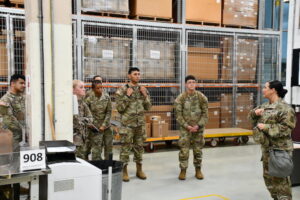
Story by C.J. Lovelace
U.S. Army Medical Logistics Command
CAMP CARROLL, Republic of Korea — The U.S. Army Medical Materiel Center-Korea provided medical logistics support and training for an Army Reserve unit during Ulchi Freedom Shield in August.
Ulchi Freedom Shield, or UFS, is an annual joint military exercise between U.S. and Korean forces that aims to strengthen the countries’ alliance and increase overall security in the region.
As the theater lead agent for medical materiel supporting U.S. Forces Korea, USAMMC-K coordinated staff working groups, provided MEDLOG expertise and estimates on materiel availability, and expectations for distribution — all in an effort to create a realistic training environment for participating joint forces.
“We play a small but essential part of the big scheme in every scenario,” said Master Sgt. Jojo Ada, USAMMC-K’s senior enlisted leader. “All DOD medical missions rely on USAMMC-K as a single source for operational medical sustainment because of what we represent in the scheme.”
USAMMC-K hosted a contingent of 10 Army Reserve Soldiers from the 362nd Medical Logistics Company, based out of Sacramento, California, who completed deployment training during the 10-day exercise that ended Aug. 29.
“With the 362nd MLC’s participation, USAMMC-K gets practical training experience in onboarding a new MEDLOG team quickly and doing practical hands-on training like what we will need to do in a real contingency that expands our workforce with newly deployed or mobilized teams,” Ada explained.
As illustrated during exercises like UFS, USAMMC-K’s role as the TLAMM is to serve as a single point of contact for the medical materiel needs for users on the Korean Peninsula, helping to prioritize efforts and ensure integration into existing medical supply chains.
USAMMC-K, a direct reporting unit to Army Medical Logistics Command, assists in communicating the needs of its customer base to suppliers and provides a receiving, storage and distribution hub for products needed for every contingency, Ada said.
Participating in exercises, such as UFS, allows the USAMMC-K team to practice its processes and ensure they are ready to meet the need when a real-world scenario arises.
“At the large-scale combat operation type of contingency, there are so many predictable casualty events we could simulate that would overwhelm the system and force operations to stall if it was not organized or we could not provide relief for the need,” he said. “Participating in exercises of this scale informs the form and style of our communications habit and rehearses the interactions so that leaders at every echelon can visualize their environment and the details they need to make better decisions.”
USAMMC-K helps provide a “feedback loop,” Ada said, that assists Army and DOD leaders in planning, improving processes and putting conditions and people in the right places to meet future needs.
“We practice on difficult challenges and set priorities for decisions now so that we have better understanding and informed responses when it happens,” he said.